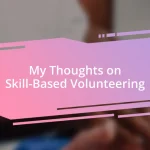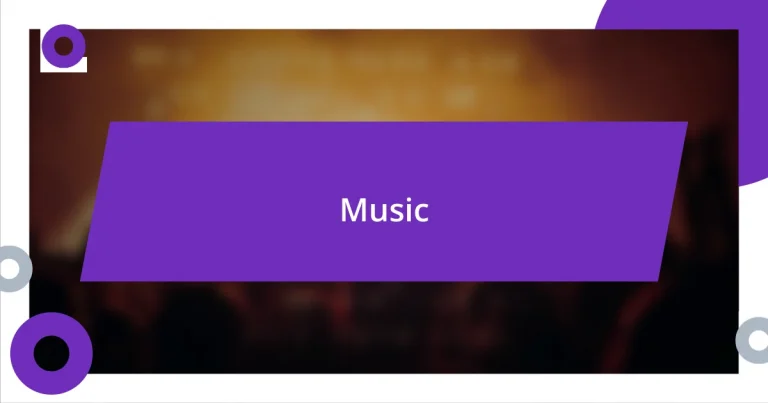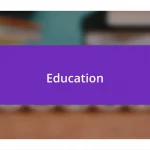Key takeaways:
- Technology enhances the learning experience by providing engaging, interactive tools that foster collaboration and make complex concepts easier to understand.
- Choosing the right tools, like task management apps and note-taking platforms, can significantly improve productivity and focus in studies.
- Utilizing digital resources, collaborative platforms, and gamified learning methods boosts motivation, retention, and the overall educational journey.
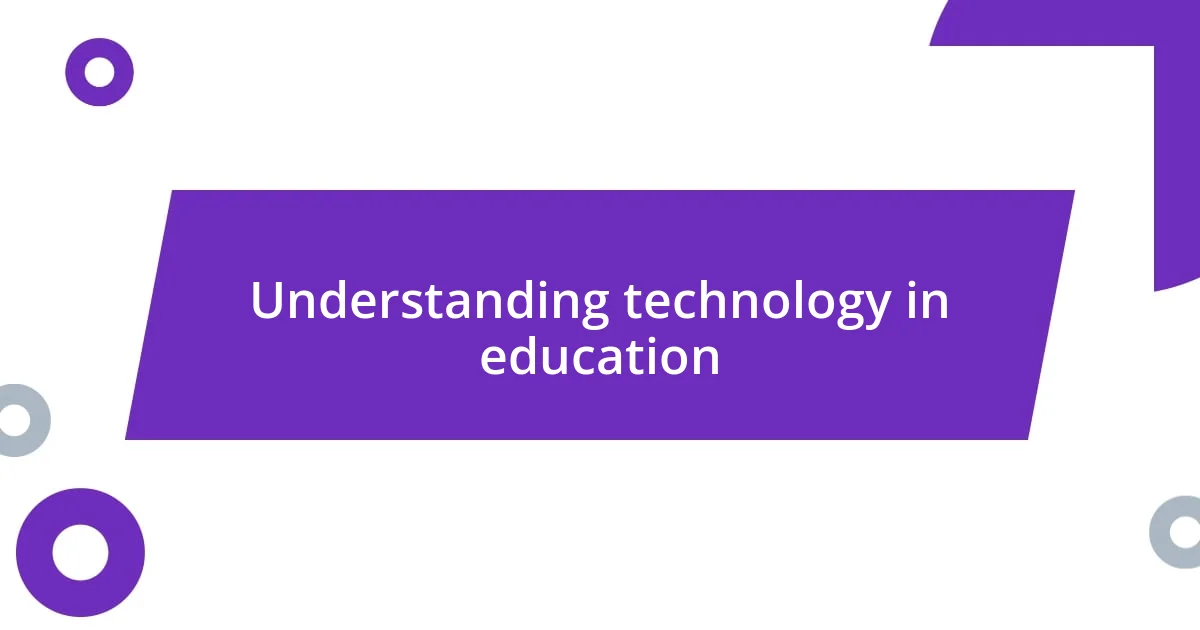
Understanding technology in education
When I first began using technology in my studies, I was surprised by how quickly it transformed my learning experience. I vividly remember struggling with a complex math concept until I stumbled upon an educational app that broke it down with engaging visuals. It was like the fog lifted, and suddenly, the topic became not just clearer, but also fascinating.
Technology in education isn’t just about apps and platforms; it’s an evolution of how we connect with knowledge. Have you ever found yourself engrossed in a video lesson, feeling as if the instructor was right there with you? That ability to learn remotely while still feeling engaged can make all the difference. It’s a bit like having a personal tutor available 24/7, which can alleviate some of the anxiety that often surrounds academic challenges.
Furthermore, I notice that tech tools help foster collaboration among classmates in ways that surprise me. Using shared documents, for instance, allows us to brainstorm and revise together in real-time, no matter where we are. Isn’t it incredible how technology can break down barriers and create a sense of community in learning? These experiences have made me appreciate the vital role technology plays in education today, bridging gaps and enhancing understanding.
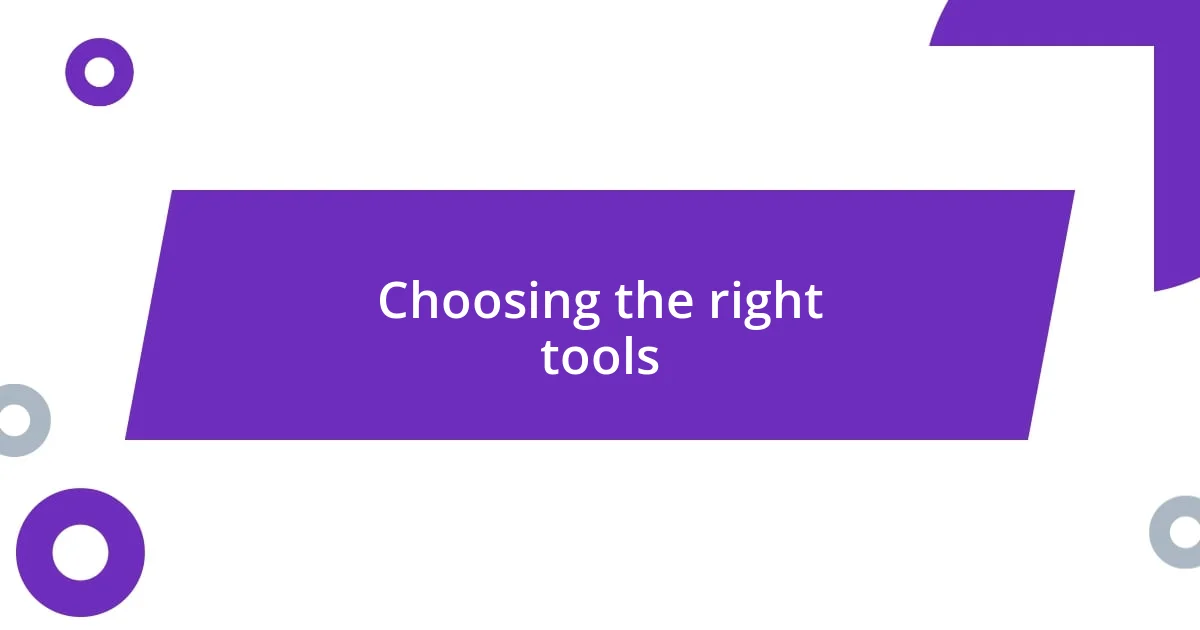
Choosing the right tools
Choosing the right tools for studying can feel overwhelming, especially with the myriad options available. I remember the first time I tried to select an app for organizing my assignments; I spent hours researching different ones. Ultimately, I chose one that had a simple interface and allowed me to set reminders. What I found was that the right tool made a world of difference. Rather than stressing about deadlines, I could focus on my learning.
Sometimes, it’s the underdog tools that surprise you. For instance, I initially overlooked a basic note-taking app because it seemed too simple. But once I started using it, I realized its effectiveness lay in its streamlined features. It helped me stay focused. Have you ever underestimated a tool only to discover its hidden potential? It’s crucial to keep an open mind when exploring technology for studies.
As I navigated the process of integrating technology into my studies, I learned that a trial-and-error approach works best. I often try out different platforms for subjects like math or science until I find the ones that align with my learning style. So, if you find a tool isn’t quite fitting your needs, don’t hesitate to switch. After all, finding the right tools can elevate your learning experience significantly.
| Tool | Purpose |
|---|---|
| Todoist | Task management |
| Notion | Notes and organization |
| Khan Academy | Interactive learning |
| Quizlet | Study aids and flashcards |
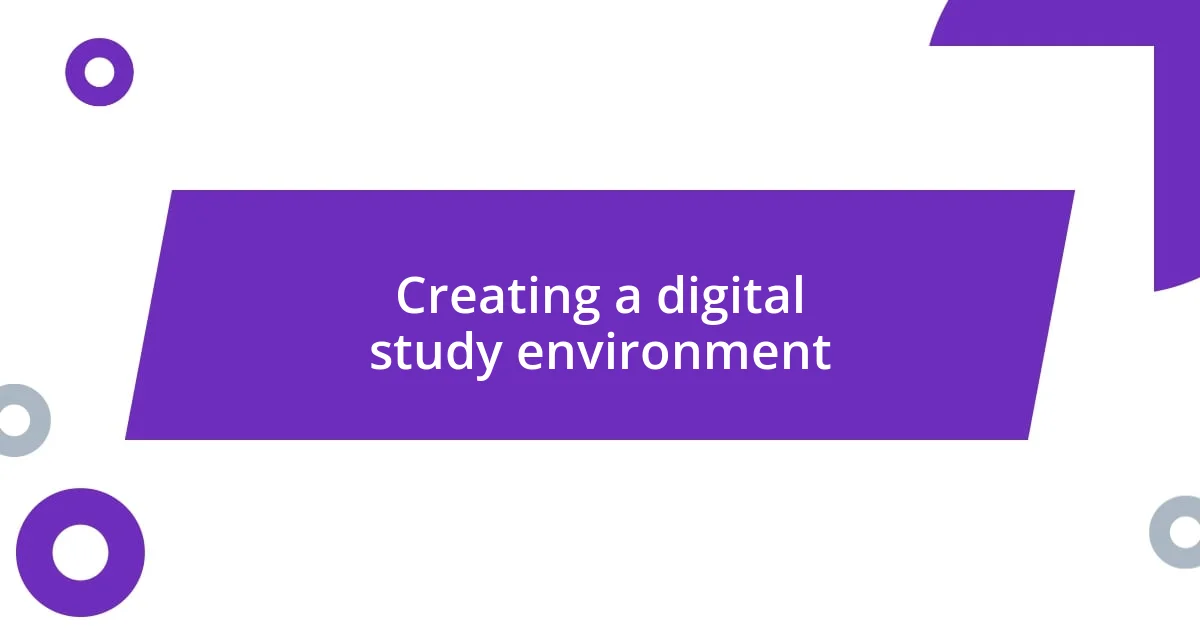
Creating a digital study environment

Creating a digital study environment
When I first thought about creating my digital study environment, I wanted a space that inspired productivity but also felt comfortable. I recall rearranging my desk to face a window, allowing natural light to flow in as I set up my laptop, noise-canceling headphones, and a cozy blanket. That simple change made me feel more energized and ready to tackle my assignments, blending comfort with technology.
To make the most of my digital environment, I established a few key practices that truly enhance my focus and efficiency. Here’s a checklist that has worked wonders for me:
- Declutter my digital workspace: I tidy up my computer desktop, keeping only necessary folders and tools visible.
- Use website blockers: Apps like Cold Turkey help me minimize distractions by blocking social media during study sessions.
- Create a dedicated study playlist: I curate music that helps me concentrate, often opting for calming instrumental tracks.
- Set clear boundaries: I communicate with housemates or family about my study hours to minimize interruptions.
- Customize my notifications: Turning off non-essential alerts during study time helps me stay in the zone.
These practices form a digital sanctuary for my studies, allowing me to be highly productive while embracing the tech tools around me. The sense of control I gain from this environment is invigorating.
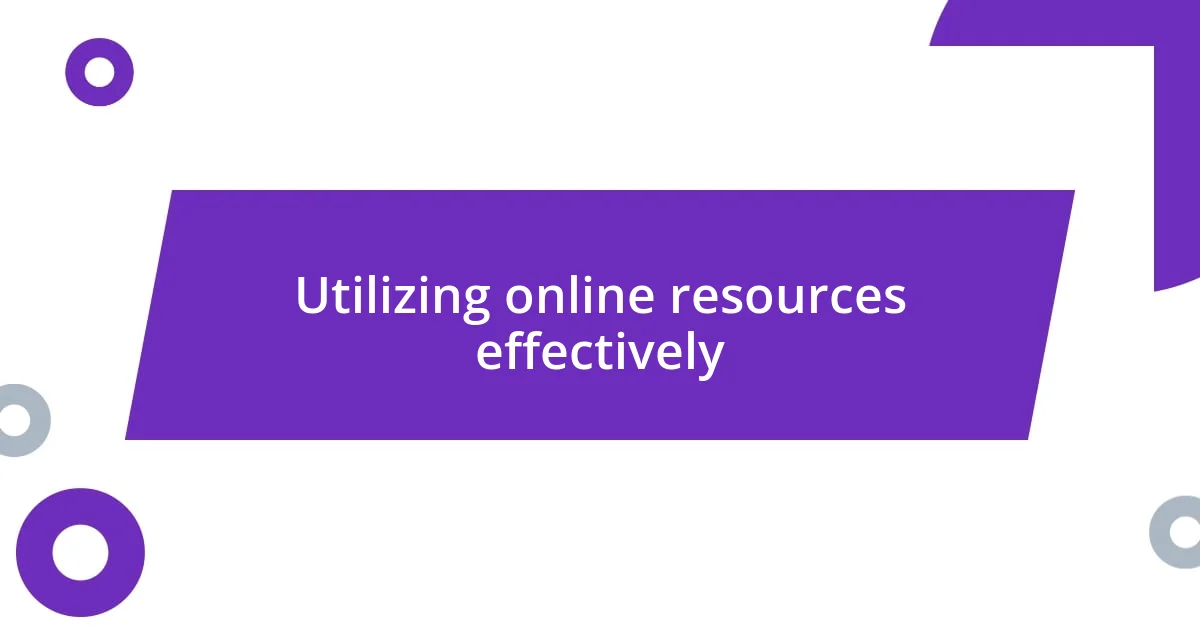
Utilizing online resources effectively
Utilizing online resources effectively involves finding ways to access and manage vast amounts of information. One of my go-to strategies is leveraging bookmarking tools. I recall feeling overwhelmed by the sheer volume of articles and videos I stumbled upon while researching for a project. Implementing a simple bookmarking system transformed my approach; I could categorize materials by subject or relevance. This not only saved time but also made me feel more organized. Have you ever had that moment where everything falls into place? It’s liberating.
Another aspect is how I engage with online courses and webinars. I still remember participating in my first live webinar—it was exhilarating yet daunting. Taking notes while the speaker shared insights directly helped reinforce my learning. I discovered that interacting in chat discussions deepened my understanding of the topic. This interaction creates a sense of community, making the learning experience richer. Do you sometimes feel isolated in your studies? Engaging with others could bridge that gap.
Lastly, I’ve learned to utilize forums and online study groups effectively. There was a time when I rarely reached out for help, thinking I had to navigate everything alone. Joining a study group online changed that perspective drastically. The exchange of ideas and support made difficult subjects feel approachable. By sharing resources and discussing challenging topics, every member in the group gained confidence and knowledge. So, think about your network: who can you reach out to for support in your learning journey? The connections you build can significantly enhance your educational experience.
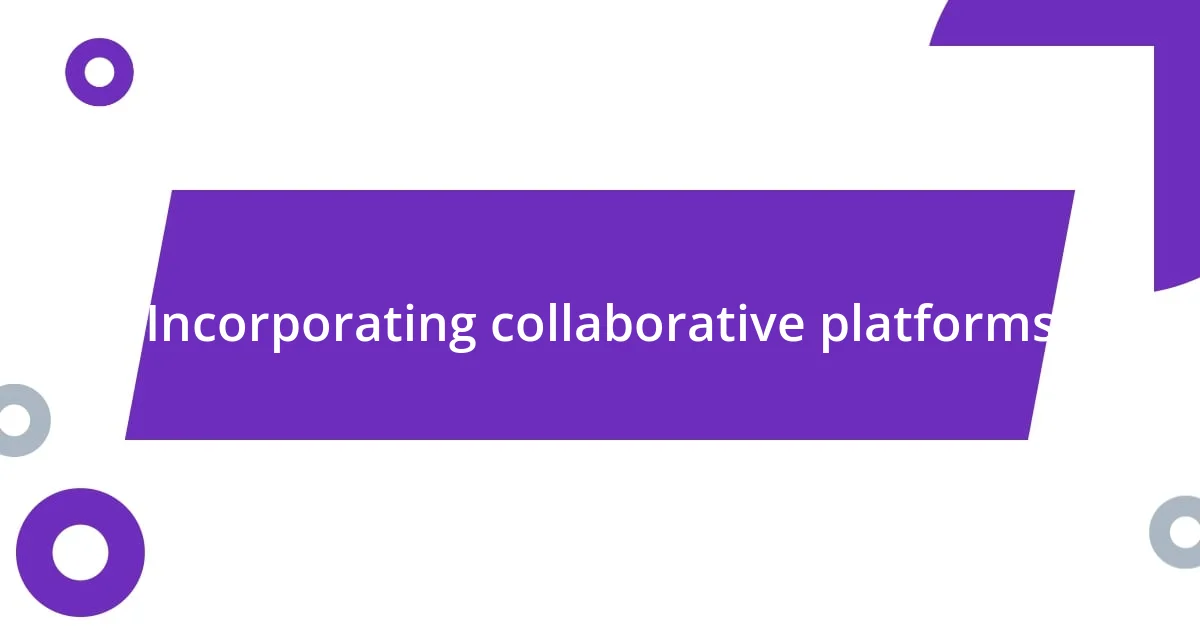
Incorporating collaborative platforms
In my experience, incorporating collaborative platforms into my studies has been a game changer. I remember my first group project using Google Docs—my teammates and I could see changes in real-time, which eliminated the back-and-forth of email threads. It was refreshing to watch our ideas evolve instantly; it felt like we were in the same room, deep in discussion, even though we were miles apart.
I’ve also found that utilizing platforms like Slack or Microsoft Teams promotes seamless communication. When preparing for a presentation, my group was able to set up channels dedicated to specific topics. This organization kept our discussions focused and efficient. The sense of camaraderie that developed over late-night brainstorming sessions fostered a collaborative spirit that I cherish. Have you ever experienced a sudden burst of inspiration from a teammate late at night? It’s exhilarating!
Additionally, I harnessed the power of Trello for project management. Creating boards and cards helped me visualize our tasks and progress. Seeing everything laid out so clearly, I felt a weight lift off my shoulders; it made the workload feel manageable. The rush of crossing off completed tasks is unbeatable. Have you ever noticed how a little visual affirmation can boost your motivation? It keeps that momentum going, driving us toward our shared goals.
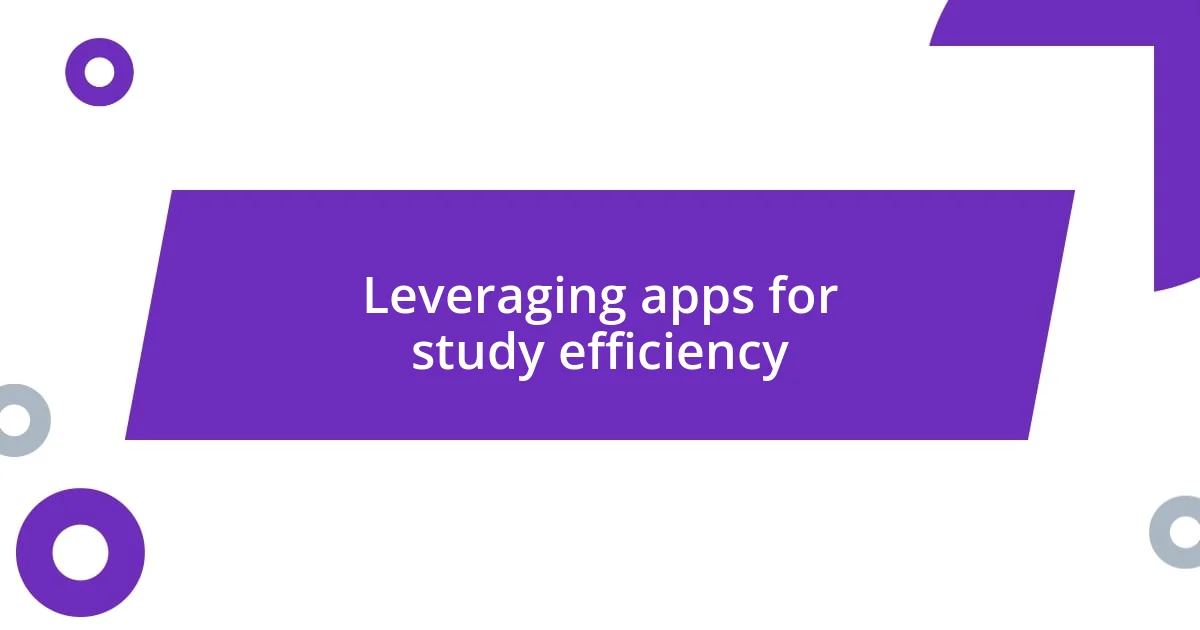
Leveraging apps for study efficiency
Leveraging apps for study efficiency makes a remarkable difference in how I manage my learning. One of my favorite tools is Notion, which I discovered during a particularly hectic semester. I started using it to organize my notes, assignments, and schedules all in one place. It felt like finding the missing piece of a puzzle. I could create different pages for each subject, and the satisfaction of having everything streamlined was incredible. Have you ever experienced that “aha” moment when everything just clicks?
I also turned to flashcard apps like Anki. Initially, I was skeptical about using digital flashcards over traditional ones, but the spaced repetition feature changed my perspective. It personalizes the study experience by focusing on what I struggle with the most. There’s something rewarding about watching my retention rates improve—it boosts my confidence and makes studying less daunting. Does the thought of actively engaging with material excite you as much as it does me?
Lastly, I embraced productivity apps such as Forest to minimize distractions. The concept is simple: you grow a virtual tree by staying focused, and it’s oddly motivating. I remember once racing against the clock to grow my entire forest during an intense study session. Seeing my collection of trees flourish felt like a badge of honor and a tangible reward for my dedication. Have you ever found motivation in a quirky or unexpected way? It’s fascinating how a little gamification can transform your study habits!
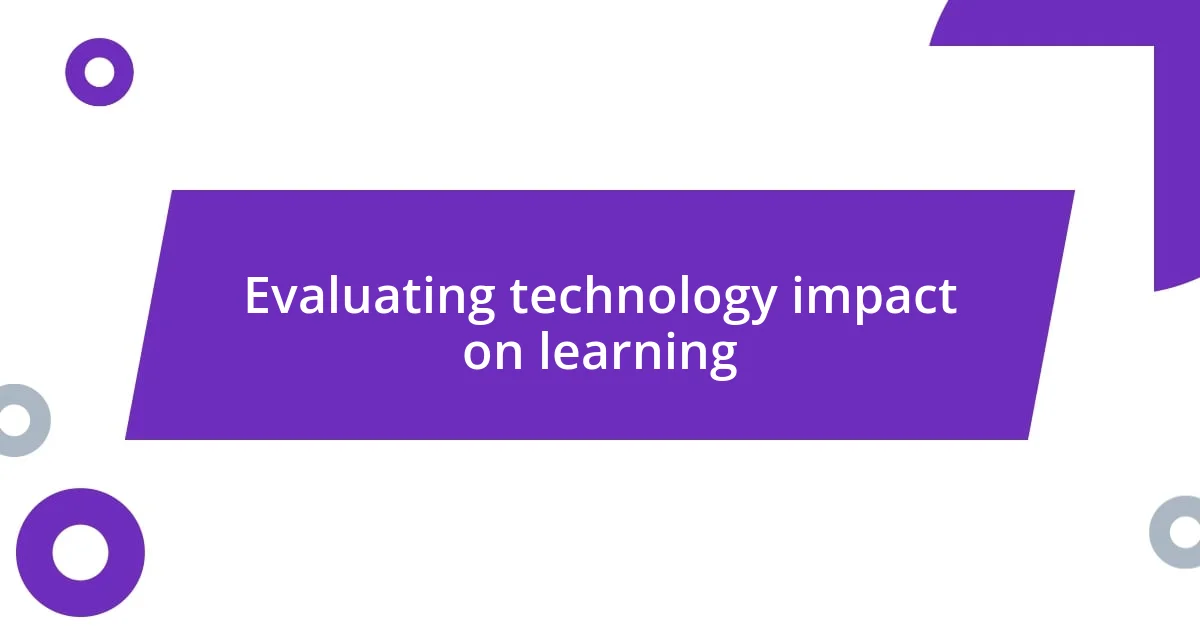
Evaluating technology impact on learning
Evaluating the impact of technology on learning is exciting yet challenging. I often find myself reflecting on how different tools have shaped my understanding. For instance, when I started using online learning platforms like Coursera, I could access a plethora of courses that expanded my knowledge base beyond classroom walls. Have you ever discovered a topic you were passionate about purely by chance? I certainly have, and it’s opened up new avenues for my studies.
Moreover, I’ve noticed that digital resources enhance my retention. Using video lectures allowed me to learn at my pace, pausing and rewinding when concepts got tricky. I vividly remember struggling with a complex math theory; replaying the explanation several times made all the difference. Does anyone else feel that sense of accomplishment when a once-confusing topic suddenly becomes clear? There’s a real sense of empowerment in mastering something that initially seemed daunting.
Lastly, the shift to technology has influenced my motivation levels dramatically. I embraced gamified platforms that reward progress, turning studying into something I genuinely look forward to. I recall a particularly grueling day when I earned a gold badge for completing a level. That feeling of achievement ignited my enthusiasm for learning. Do you believe that little incentives can significantly alter our motivation? I’m a firm believer that these small victories pave the way for bigger successes in our educational journeys.






